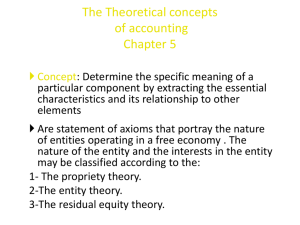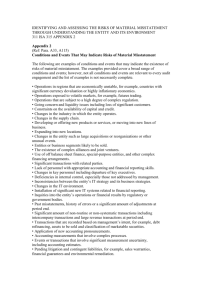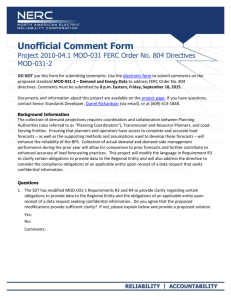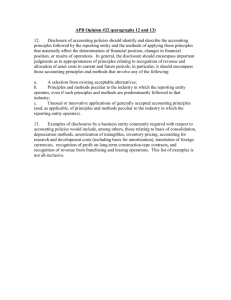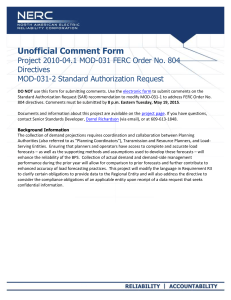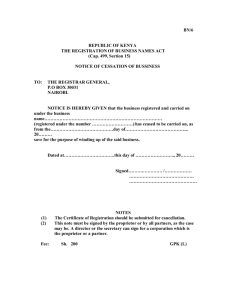Entity Theory - Oman College of Management & Technology
advertisement
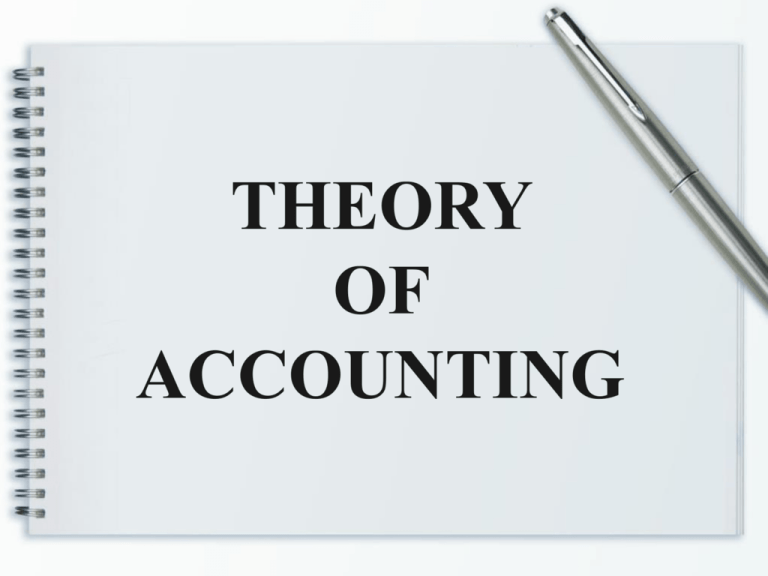
THEORY OF ACCOUNTING CHAPTER OUTCOMES Meaning of Government & Non-Profit Organization Theoretical Concepts of Accounting DIFFERENCES BETWEEN GOVERNMENT & NON - PROFIT ORGANIZATIONS VS. BUSINESSES Serve entirely different purposes. Govt. & Non-Profit organizations are generally financed by taxpayers, donors, and others who do not expect to receive proportional benefits. Govt. &Non-Profit organizations focus on benefits/services while businesses focus on revenues/profits. Accounting is a service activity. Its function is to provide quantitative information, primarily financial in nature, about economic entities that is intended to be useful in making economic decisions, in making reasoned choices among courses of actions. TYPES OF GOVERNMENTS General purpose governments – States, counties, municipalities – Police and fire protection, sanitation, streets, roads, bridges, etc. Special purpose governments – Provide only single function or a limited number of functions – School districts, public colleges and universities, public utilities NONPROFIT ORGANIZATIONS Exist in many forms and serve many functions – – – – – – Private colleges and universities Various kinds of health care organizations/hospitals Professional and trade organizations Fraternal and social organizations Religious organizations Foundations THEORETICAL CONCEPTS OF ACCOUNTING Theoretical concepts of accounting: self-evident statements that portray the nature of accounting entities operating in a free economy characterized by private ownership of property. The Proprietary Theory The Entity Theory The Fund Theory THEORETICAL CONCEPTS Proprietary Theory The proprietary theory adapts best to sole proprietorship and partnership , though corporations are also influenced by this theory to some extent. Proprietor group as the center of interest which accounting records are kept and financial statement are prepared. Directed to serve the owners and maximize their profits. Proprietary Theory Is the determination and analysis of the proprietor’s net worth Accounting equation is ; ASSETS-LIABILITIES=PROPRIETOR’S (owners) EQUITY More assets center and balance sheet oriented. Net income (Revenue – Expenses ) is the change in owners’ equity during a given period. Limitations: The development of nature of business and laws Entity Theory The entity theory adapts best to Cooperation's. Entity is separate and different from those who provide capital Business unit owns the resources of the enterprise and is liable to claim of the owner and the creditors. Directed to serve the shareholders and creditors , to maximize their profits. Two versions of the entity theory: Traditional view: the business firm operates for the benefit of the equityholders, those who provide funds for the entity. New interpretation: the entity is seen as in business for itself and interested in its own survival. Entity Theory Net income dose not belong to the proprietor (owners) , but to the entity. Accounting equation is; ASSETS= EQUITIES ASSETS=LIABILITIES + STOCKHOLDER’S EQUITY Fund theory: Basis of accounting, neither the proprietor nor the entity as separate person, is on group of assets and related obligations and restrictions. Business (accounting) unit as consisting of economic resources (funds) and related obligations/restrictions regarding the use of the resources. Equation: Assets = Restrictions on Assets The broad concept of fund theory introduce the cash flow statement. NEED FOR PUBLIC ACCOUNTABILITY • To help stakeholders assess – How public resources are acquired and used – Whether current resources were sufficient to meet current service costs – Whether some costs were shifted to future taxpayers – Whether the government's ability to provide services improved or deteriorated FINANCIAL REPORTING OBJECTIVES FOR STATE AND LOCAL GOVERNMENT • Financial reporting is used in making economic, social, and political decisions and in assessing accountability primarily by – Comparing actual financial results with the legally adopted budget – Assessing financial condition and results of operations – Assisting in determining compliance with finance-related laws, rules, and regulations – Assisting in evaluating efficiency and effectiveness FINANCIAL REPORTING OBJECTIVES FOR CENTRAL GOVERNMENT • Financial reporting should help to achieve accountability and is intended to assist report users in evaluating: – – – – Budgetary integrity Operating performance Stewardship Adequacy of systems and controls FINANCIAL REPORTING OBJECTIVES FOR NONPROFIT ORGANIZATIONS • Financial reporting should provide information useful in: – – – – Making resource allocation decisions Assessing services and ability to provide services Assessing management to care of project and performance Assessing economic resources, obligations, net resources and changes in them

